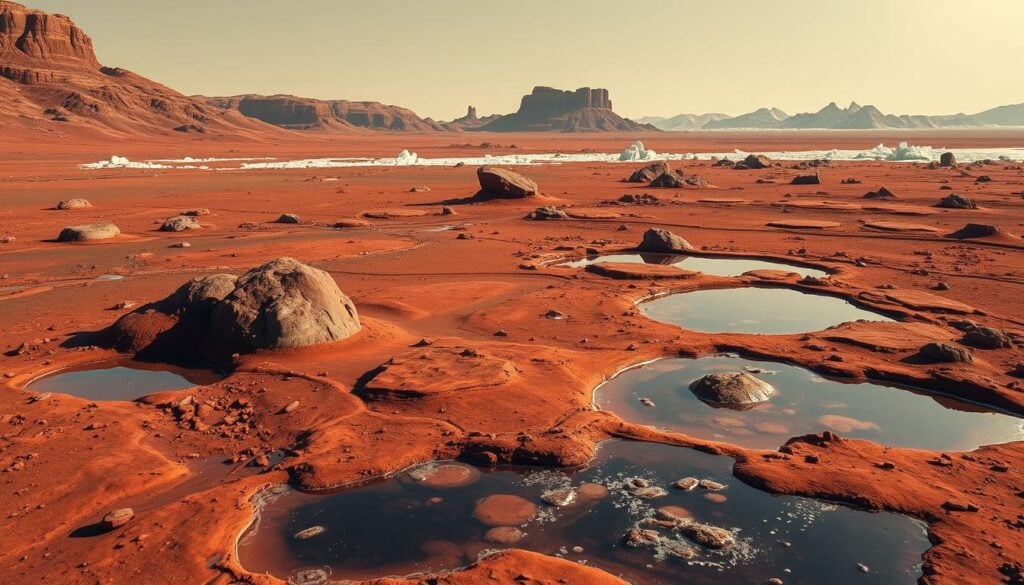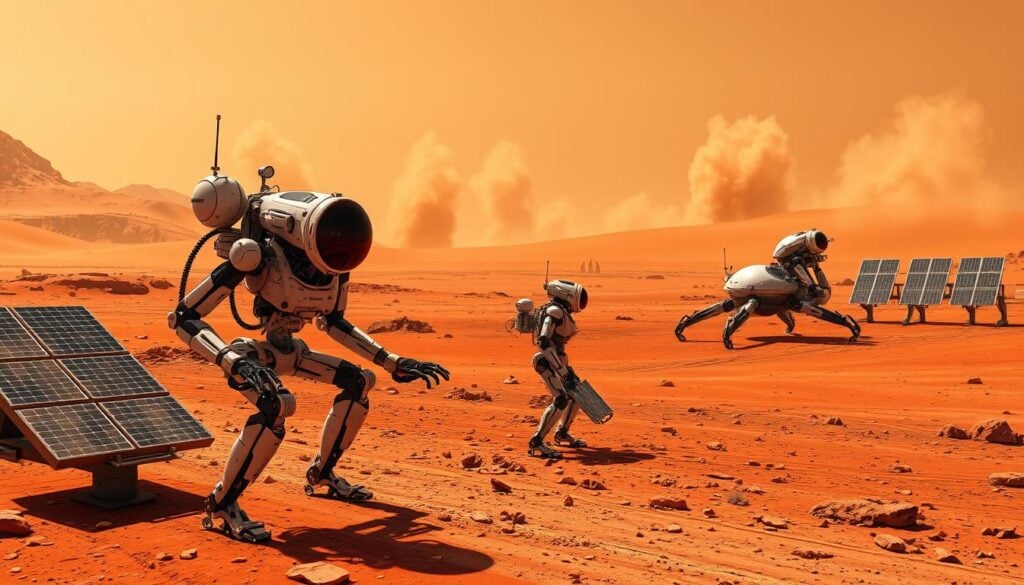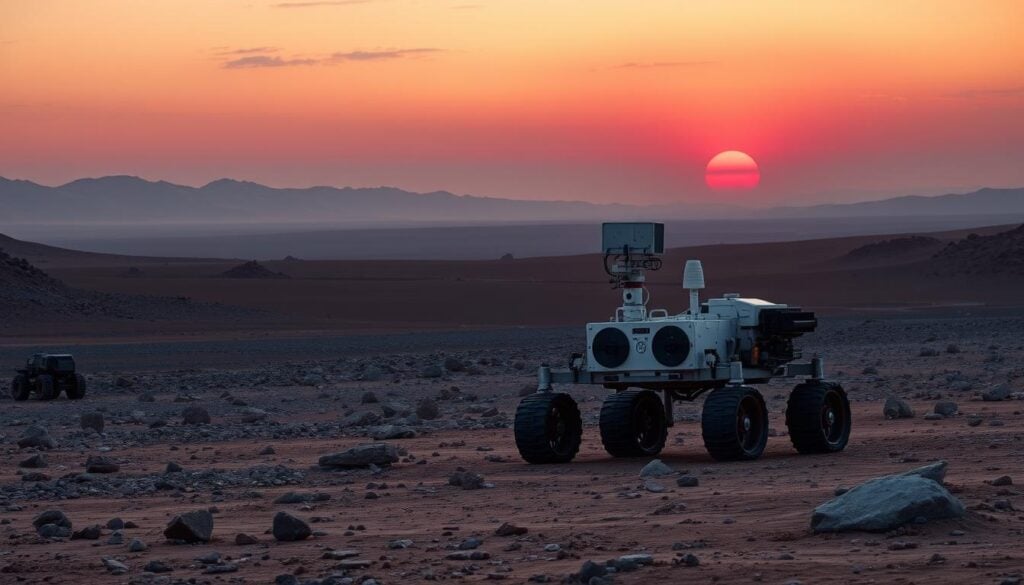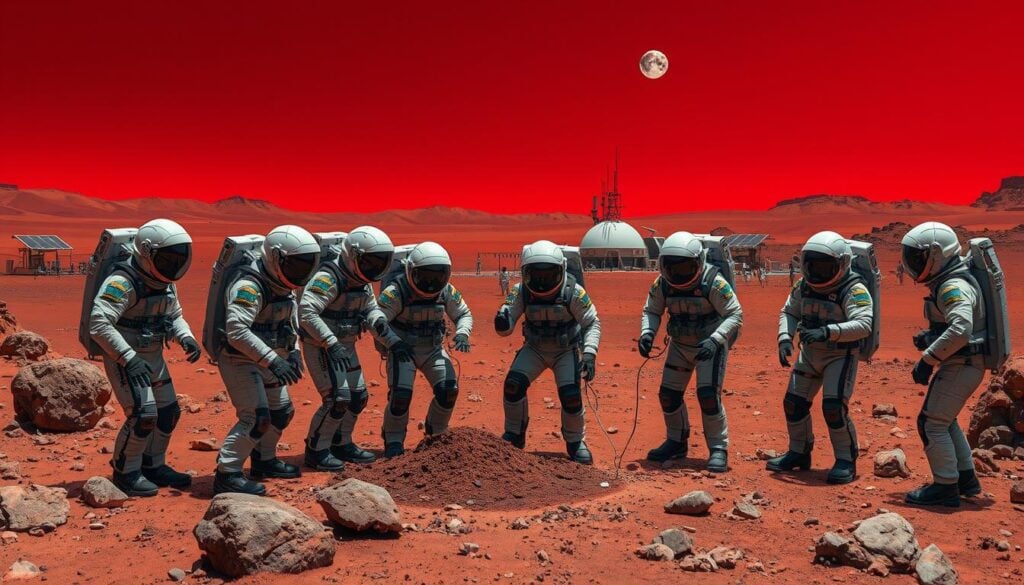The world is excited about the latest Space Exploration news. NASA’s missions to Mars are leading the way. The Perseverance rover and Ingenuity helicopter are exploring new areas of the Red Planet. They show us how Mars might support human life in the future.
These missions aim to find signs of past life on Mars. They also study the planet’s geology and climate. This research helps us understand Earth’s history and the origins of life. It’s also key for planning human missions to Mars.
The latest Mars missions mark a big moment in human history. They will change how we see the universe and our future. We’re learning about advanced Rockets and life systems. We’re also training new Astronauts for space travel.
Understanding the Current Mars Missions
Space Exploration has reached new heights with the ongoing Mars missions led by NASA and other international space agencies. The Perseverance rover, launched by NASA in 2020, is the latest chapter in the agency’s long history of exploring the Red Planet. Its main goal is to search for signs of ancient microbial life and collect rock and soil samples. These samples will eventually be returned to Earth for further analysis.
China’s Tianwen-1 mission, launched in 2020, also aims to study the Martian surface, atmosphere, and environment in detail. This ambitious mission includes an orbiter, a lander, and a rover. All these components work together to provide a comprehensive understanding of the planet’s geology and potential for sustaining life.
These Mars missions are pushing the boundaries of space technology. They use advanced sensors, cameras, and communication systems to gather valuable data. The information collected by Perseverance and Tianwen-1 will help scientists better understand the history and composition of Mars. This will pave the way for future human exploration and potential colonization efforts.
By collaborating and sharing their findings, NASA, the Chinese National Space Administration, and other space agencies are contributing to our collective knowledge of the Red Planet. They are furthering the quest for understanding the origins of the solar system and the potential for life beyond Earth.
The Importance of Water on Mars
The search for water on Mars is key in space exploration. Recent missions have found evidence of water, like ice and possibly liquid. This discovery is big for understanding life beyond Earth and for future Mars settlements.
Water on Mars is exciting because it shows the planet might have been more friendly to life. Water is essential for life, and using it on Mars could help any human colonies. Also, Martian water ice could be used for drinking, farming, and even fuel.

Future space missions will focus on studying Martian water. Scientists want to know more about water’s distribution, amount, and state. They also aim to use it for human life on Mars. As we learn more about Martian water, it will help plan future space missions and settlements.
Technology Advancements from Mars Exploration
The quest for space, especially Mars missions, has brought us many new technologies. These include robotics, artificial intelligence, materials science, and communication systems. These innovations are changing our lives on Earth.
Robotic systems have seen a big leap forward thanks to Mars. Rovers and landers have improved how robots move and work. Now, these robots help in healthcare, making better surgical tools and prosthetics.

Artificial intelligence (AI) has also grown a lot because of Mars. AI algorithms, made for Mars, help in many areas. They’re used in monitoring the environment, predicting maintenance, and even in healthcare and smart cities.
New materials and communication tech are also key from Mars missions. These advancements help with space’s harsh conditions. Now, they’re used in building materials and satellite connections, changing many industries and improving lives.
As Mars exploration keeps advancing, so will the benefits of these technologies. They will shape the future of space and make our lives better on Earth.
The Quest for Signs of Life
Space exploration is moving forward, and finding signs of life elsewhere is a big goal. Many missions are focused on Mars. It’s seen as a place where life might exist now or have existed before.
The SHERLOC instrument is a key tool in this search. It’s part of the Mars 2020 Perseverance rover mission. SHERLOC looks for organic compounds and minerals that could show life was there.

These discoveries help us understand if Mars could have life now or had it before. They also help us think about if life exists elsewhere in the universe. The search for life is exciting and important for our understanding of space.
International Collaborations in Space Exploration
The future of Space Exploration is a team effort, not just for one agency. NASA, the European Space Agency (ESA), and the China National Space Administration (CNSA) are working together. They aim to explore Mars and beyond.
These partners are sharing data and research. For example, the ExoMars program is a joint effort between NASA and ESA. It has sent a rover to Mars to search for life.

By working together, scientists and astronauts are making faster progress. They share data and technologies to solve Mars’ mysteries. This teamwork shows the power of global cooperation in Space Exploration.
As we move forward, more countries will join the Space Exploration quest. This teamwork is not just good for science. It also brings nations together, showing the impact of Space Exploration on unity.
The Economic Impact of Mars Missions
The world is diving deeper into space, and Mars missions are getting more attention. These missions cost a lot, but they bring big benefits. They’re not just about finding new things in space.
Space Exploration, Colonization, and Space Shuttles have led to new technologies. These technologies help many industries. They improve things like energy, water, materials, and even medicine.
Private companies like SpaceX and Blue Origin are changing the space game. They’re making space travel cheaper and more accessible. This could open up new ways to make money, like space tourism and mining.
Nations working together on space projects will likely see more economic gains. Jobs, new technologies, and even space-based industries will grow. Mars missions are key to our future in space.
Space Exploration and Environmental Awareness
The world is facing a big challenge with climate change. Space exploration and environmental awareness are closely linked. Mars missions have helped us understand planetary ecosystems and climate factors.
By studying Mars’ atmosphere and geology, scientists have learned a lot. They’ve gained insights into Earth’s climate history. This knowledge helps us understand Earth’s climate better and how human actions might affect it.
Space exploration has also led to new technologies. Satellite imaging and remote sensing are now key for monitoring Earth. They help track deforestation, monitor wildlife, and measure greenhouse gases. These tools have changed how we collect and analyze environmental data, helping us protect our planet.
As we explore space further, the knowledge we gain will be vital. It will help us take better care of our planet. This will ensure a sustainable future for all of us.
The Philosophical Implications of Mars Missions
Mars missions have made us think deeply about our place in the universe. Exploring Mars and possibly finding alien life changes how we see ourselves and life. Starting human colonies on Mars brings up big questions about our duties as explorers.
Our search for space has always been driven by curiosity and a need to know where we come from. Finding life on Mars would change how we see ourselves. It could make us rethink our beliefs and our role in the universe.
Also, colonizing Mars raises big ethical issues. Should we make another planet like Earth, or should we respect other planets and their life? How do we balance wanting to grow and explore with protecting other worlds? These questions will shape our future in space and our connection to the universe.
Looking Ahead: The Future of Mars Exploration
NASA’s latest Mars missions are amazing. They show us the endless possibilities in space exploration. Soon, humans will travel to Mars, marking a new era in space travel.
New technologies will make traveling between planets easier. Things like nuclear engines and closed-loop life support systems are being developed. These advancements bring us closer to living on Mars.
NASA and other countries have big plans for Mars. They aim to explore the planet and create homes for future space travelers. This is just the beginning of our journey in space.
These missions are also preparing us for interstellar travel. By exploring Mars, we learn how to travel to other planets and stars. The knowledge gained will help us reach for the stars, changing our view of the universe.



